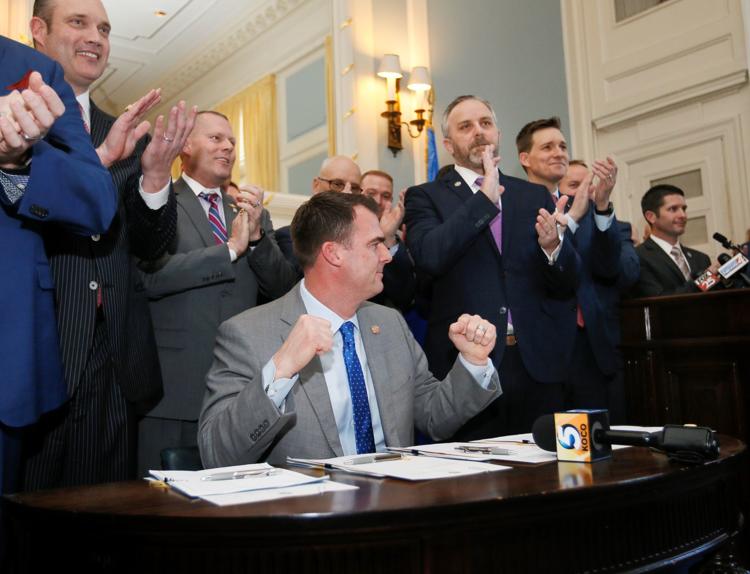
With the stroke of a pen last week, Kevin Stitt became the most powerful governor in Oklahoma history.
Stitt signed five bills that give him the power to hire and fire the heads of five big state agencies: the departments that oversee highways, mental health, juvenile justice, prisons and Medicaid.
Previously, citizens oversight panels dominated by previous governors’ appointees had hired and fired the agencies’ heads. Restructured oversight panels will remain to approve policy changes (and preserve transparency), but the top of the bureaucracy will answer to a new boss — the governor.
Combined with similar governance changes at the Department of Human Services and the state Health Department dating from Mary Fallin’s administration, Oklahoma now has a governor worthy of the title.
We haven’t made Stitt our monarch, but we’ve made him the state’s CEO, the true head of the executive branch of government.
Mostly.
Stitt and future governors remain essentially interested observers in a big chunk of state government.
The biggest exceptions to the governor’s power are in education.
The elected state superintendent of public schools retains authority largely unfettered by the governor’s direct influence over the largest single piece of the state budget — public schools. If Superintendent Joy Hofmeister and Stitt didn’t get along, he’d just have to live with it. He certainly couldn’t fire her.
Also, the state Regents for Higher Education remain largely outside the governor’s direct influence. After decades of political cronyism in higher education, Oklahoma voters guaranteed that unelected independence in a series of constitutional amendments starting in 1941. The regents hire the state chancellor, who oversees the higher education system. A variety of separate boards of regents hire university presidents.
The governor appoints all those regents, but he inherits governing boards from his predecessor and only slowly takes control. In the case of the state’stop higher education board, the state regents, there are nine members serving staggered terms. In the normal course of things, no governor gets a voting majority on the board until his second term in office.
So, hypothetically, Stitt’s appointees could fire Chancellor Glen Johnson if that’s what he wanted … in 2023.
There are other parts of state government that are largely outside the governor’s control.
The state’s top law office, the Attorney General’s Office, is also independent of the governor. When the governor and attorney general come from the same party, they generally get along fine, but not always. Ask former Gov. David Walters, who was hounded by a Democratic attorney general’s grand jury investigation for most of his administration. The irony was that the attorney general during most of the Walters administration was Susan Loving, who was appointed to the job by Walters after the elected officeholder, Robert Henry, resigned to become a federal judge. Elected or not, Loving was independent of Walters, and she proved it to her honor.
The state labor and insurance offices are also elective and largely independent of the governor’s authority.
While the independent attorney general makes obvious sense, it’s harder to justify the labor and insurance situations. Those jobs are essentially unpolitical (or should be) and administrative in nature. Voters complain when they see the offices on the ballot because they don’t know who the candidates are or what the commissioners do.
You could argue that the state superintendent is also essentially a nonpolitical administrative post, but I think Oklahoma voters are more invested in who runs education policy in the state, and they want that job kept independent.
Stitt made reforming the executive branch of state government a high priority in his election platform. A businessman, he said he wanted to make state government more businesslike, which required making the bureaucracy answerable to the CEO.
He was right, and the legislation giving him direct authority over the five agencies is a strong step in that direction.
Reforming the insurance and labor agencies in the same fashion should be the next step. That would require a constitutional amendment and a vote of the people.
For the entire article logon on to: www.tulsaworld.com










